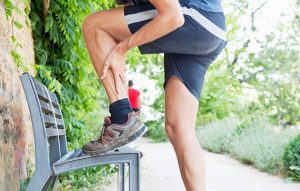 You don’t have to be an accomplished athlete to suffer Achilles tendon injuries. They can occur from performing minor household tasks, such as climbing a ladder. Achilles tendon weakness is common in adults and prompt treatment when symptoms occur can prevent more serious injury.
You don’t have to be an accomplished athlete to suffer Achilles tendon injuries. They can occur from performing minor household tasks, such as climbing a ladder. Achilles tendon weakness is common in adults and prompt treatment when symptoms occur can prevent more serious injury.
The Achilles tendon is the longest and strongest tendon in the body, but is subjected to considerable wear and tear. When the tendon becomes inflamed from overuse or too much sudden stress, tendonitis can weaken it over time and cause microscopic tears. Going without treatment increases risk for further deterioration and possible rupture.
According to the American College of Foot and Ankle Surgeons consumer website, FootPhysicians.com, pain, stiffness and tenderness in the area are the main symptoms of Achilles tendonitis. Pain occurs in the morning, improves with motion, but gets worse with increasing stress and activity.
In addition to athletes, Achilles tendonitis is common for anyone whose work routine puts constant stress on the feet and ankles. Achilles tendon injuries happen most often to less conditioned, “weekend warrior” athletes who overdo it. But I’ve also had patients who have ruptured the tendon simply by climbing a ladder quickly.
When pain and other symptoms indicate possible Achilles tendonitis, a thorough diagnosis is necessary to determine the extent of the trauma and evaluate the flexibility and range of motion in the tendon. Treatment options depend on the extent of the injury and may include:
* Casting to immobilize the Achilles tendon and promote healing
* Ice to reduce swelling
* Non-steroidal anti-inflammatory medication to reduce pain and inflammation
* Physical therapy to strengthen the tendon
* Surgery, if other approaches fall to restore the tendon to its normal condition
Recreational activities involving jumping and running are the major causes of Achilles tendon injuries. In sports like basketball and tennis, muscles and tendons in the back of the leg are prone to injury from an imbalance that occurs from a lot of forward motion. As a result, the frontal imbalance can weaken the tendon unless stretching exercises are performed regularly.
He added that the best way to prevent Achilles tendon injuries is to warm up gradually by walking and stretching. Further, it’s best to avoid strenuous sprinting or hill running if you are not in shape for it.

